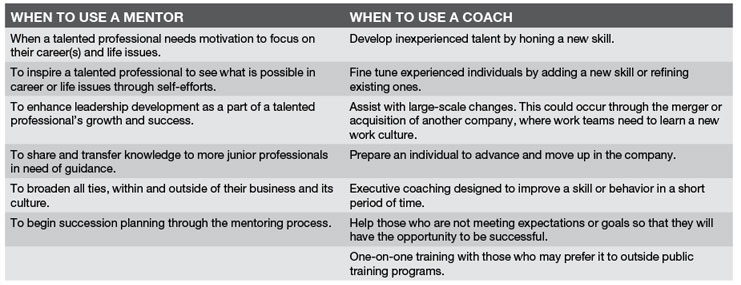
Mentoring vs. Coaching
Which Do I Need?
By Beth Borrego / Published April 2022

At some point, business owners and their employees alike benefit from receiving either mentoring or coaching. These two terms are not interchangeable, and knowing the difference between the two is important when trying to decide which one is right for you. This article will explore both mentoring and coaching and will also outline the differences.
Merriam-Webster Dictionary tells us that a mentor is a trusted counselor or guide, someone trusted to give advice when it is needed. Having a mentor is a transformational experience. A mentor is someone who has been in situations similar to the ones you find yourself in and has faced challenges not unlike your own. Broadly put, a mentor is a trusted advisor and provides support and feedback that is critical to future success.
Mentors give of their time and experience for no personal gain, as a way of giving back to others, and are experienced, successful, and willing to provide intellectual guidance. At times, they supply much needed emotional support. The mentor-mentee relationship is typically long term and may last years, with the goal being one of personal and professional growth for the mentee. Often, the relationship between mentor and mentee evolves and a friendship is formed.
There are many potential sources you can use to locate a mentor. The Small Business Administration sponsors SCORE Mentors, Small Business Development Centers, Women’s Business Centers, Veteran’s Business Outreach Centers, and the Minority Business Development Agency. If your business either sells or plans to sell products or services to the federal government, you might want to look into the GSA’s mentor-protégé program, designed specifically to help small businesses who want to become government contractors.
If your company has a membership with a non-profit organization, it’s worth exploring the benefits to see if a mentoring program is among them. Finding a mentor can be even simpler, and those who are just
starting out might look to family and friends for advice in a less formal mentoring role. If you’ve established what your business’s focus will be, you might also reach out to a competitor who does not serve your geographic region or perhaps a business that serves the same market segment but with a product or service not directly competing with yours.
Don’t confuse mentoring with coaching. A mentor will help you to grow professionally and will ask you questions designed to challenge you and guide you but will not necessarily direct you specifically on what to do. Perhaps brainstorming and problem-solving discussions will take place, for example, but ultimately what you decide to do is up to you. Your mentor will give you the space to learn and grow personally and professionally but will not spoon feed you or try to run your business for you.
Be prepared to answer various questions: What is your business objective? What is your end vision? Where do you want to see yourself five years from now? Reflecting upon the importance of time for both business and your personal life and what you want to achieve in both is an important part of personal and professional growth. What kind of person do you feel would be the best mentor for you, and what type of expertise would be most helpful to your business? Consider characteristics such as listening skills, general personality, areas of expertise, and the mentor’s business and personal success.
Coaching becomes necessary when an owner, manager, or employee needs to acquire or develop specific skills. Coaches are paid to basically teach or train with specifically defined goals in place. The results of the coaching can be identified in measurable terms such as productivity on a specific task. While coaching can be long term, it is often shorter in duration, lasting only until the pre-defined goals are met and the required skills are achieved.
Coaches ask specific questions designed to develop measurable goals for the benefit of coaching the employee. It’s understood that the goals are geared toward increasing the bottom line of the company and improving the employee’s performance in some way. Coaches work for the owners and managers of the company. This means that if the coaching efforts are successful, it’s a win-win situation. If the coaching doesn’t achieve the desired results, a decision may need to be made about the employee receiving the coaching.
Some common questions coaches use might look like this:
- What is the goal of this discussion?
- What goal or activity are you working on?
- What is it you are working on, and what do you want to accomplish?
- Are the goals we are setting positive, attainable, and measurable?
- Are there any obstacles that would hinder or prevent attaining the goals, and how are they going to be addressed?
- What are the measureable milestone points that will be used to determine if the employee is on track?
When should you choose a mentor over a coach? If your company needs to develop its employees to improve specific skills, a coach can help. Some-times a coach may be used when a company has a number of employees who are not meeting expectations in some way. In addition to working one-on-one with a single employee, a coach can also work with a small group of employees in a team-oriented approach to train or retrain them. A coach may also be another manager in the company or even the manager the employee reports to in small companies.
A mentor may be necessary when a company wishes to develop its leaders. This may be part of succession planning, for example. Mentoring may also be useful if the goal is to develop a workforce that balances the work with personal and professional development. Mentors may also be effective at developing employees in diverse situations where barriers might otherwise hinder their success.
How will you know when to use a coach versus using a mentor? The next page has a comparison chart to guide you.
Let’s look at the differences between mentoring and coaching:
It’s clear that there are different activities associated with both mentoring and coaching. Robert Dilts defines them as guiding, coaching, teaching, mentoring, and counseling. Guiding is the process of directing a person from a present state to a desired state or end result. Coaching is the process of teaching or enhancing a skill or knowledge to improve a specific performance objective. Teaching helps to develop cognitive skills and capabilities in an individual or in a group setting. Mentoring is the nurturing and shaping of an individual with an emphasis on long-term career goals and objectives, and counseling is helping an individual to improve performance by resolving past issues. It’s clear that all of these activities are woven into the fabric of both professional and employee development over time. Some are initiated by the manager or owner for the benefit of their staff, while others are aimed at the owner or at other managers who wish to better themselves personally and professionally.







